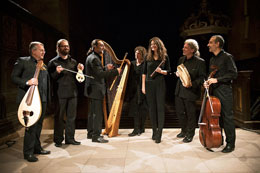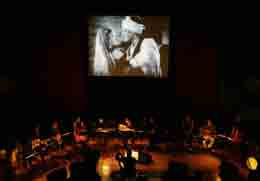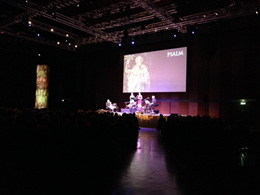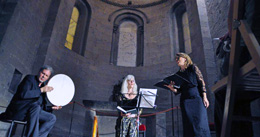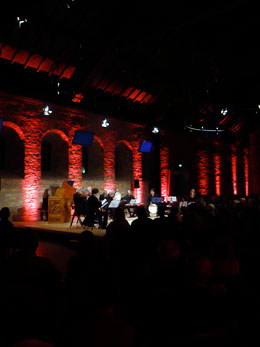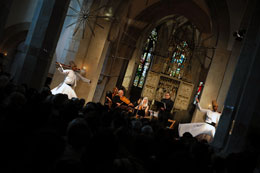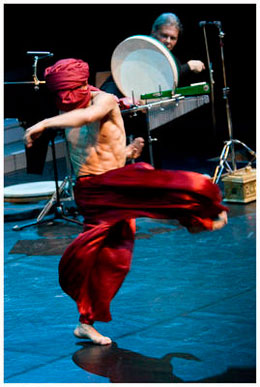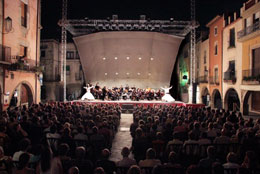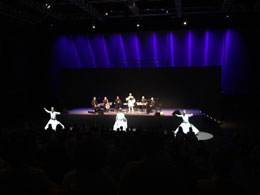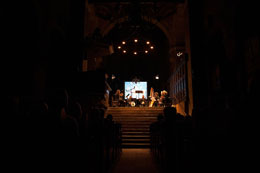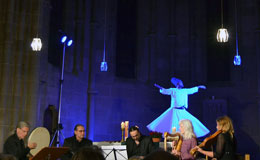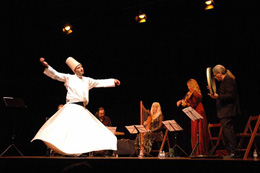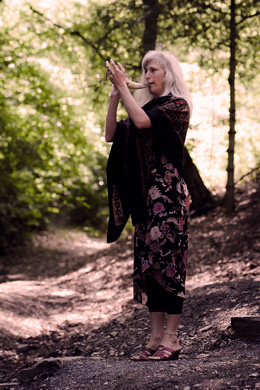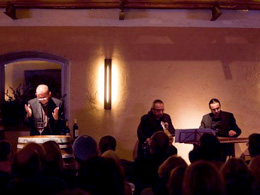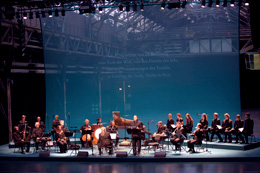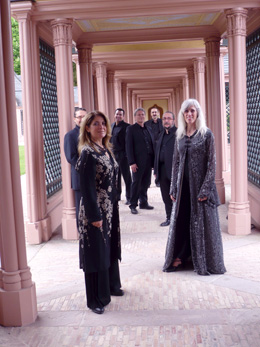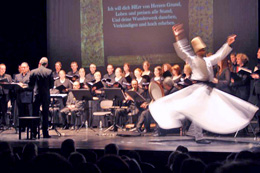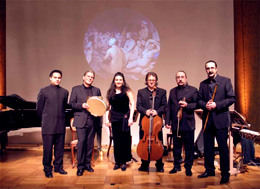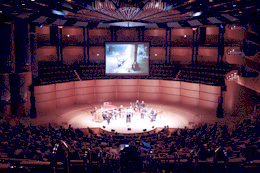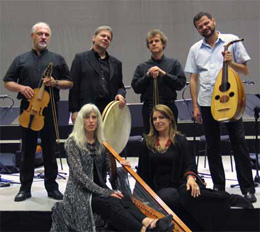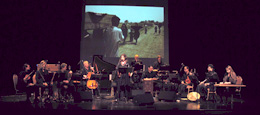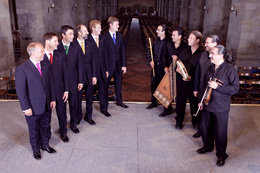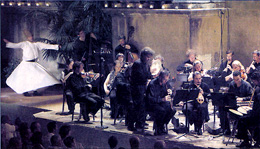Content
Brother Sun, Sister Moon: «Auch wenn Miriam Anderséns Glockenstimme und Rebal AlKhodaris exaltierte Vokalarabesken sowie Fadia el-Hages dunkler Gesang für sich allein genommen gewiss ein Vergnügen sind - die wahre Faszination ergibt sich erst aus dem Ganzen, das mehr ist als die Summe seiner Teile. So muss es auch das Publikum empfunden haben, das diesen von Engeln eingegebenen Melodien mit Andacht lauschte. Wie kann es sein, dass so unscheinbar schlichte Musik Hörer so lange in Atem hält?» Martin Gasser, Kronen-Zeitung (Austria), 27.3.18
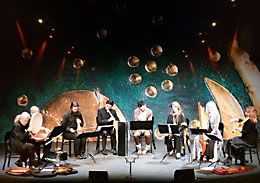
What the World needs now: «A maximum quality time- and culture-crossing. American folk songs with Scottish and British roots met Sephardic lullabies and Arabic laments and eulogies. It was marvellous to witness how the musicians from different cultures, but all living in Germany, found a common musical homeland. And deliverd a message definitely to endorse: that love will overcome all wars.» Antje Doßmann, Neue Westfälische (Germany), 1.8.17
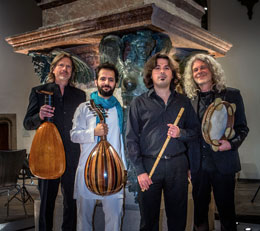
«Ivanoff beherrscht als Freigeist die Kunst des organischen Umbaus der Vorgaben, zeigte dabei die Vielfalt und die Ähnlichkeit musikalischer Ursprünge … Diese Form der kulturenübergreifenden Offenheit wurde vom Publikum begeistert gefeiert.» Joerg Konrad, KultKomplott.de, 22.3.15
«For decades, the Bavarian Bulgarian Vladimir Ivanoff, with his Ensemble Sarband, has been amongst the leading mediators between Oriental and Western Classical music.» Jens Voskamp, NN, 5.8.14
Passio-Compassio: «Between Orient & Occident -
Concert by Sarband at the Beethovenfest Bonn -
Orient met Occident, Christion Baroque music
encountered Turkish and Syrian-Orthodox chants,
performed by Sarband, directed by Vladimir Ivanoff
… A remarkable experiment … The key to the
successful blend was the alienation effect. And the voices of the flexible, excellent Fadia El-Hage and Dogan Dikmen, who supported the alliance. The result levitated between the different traditions, shaped a bridge between Orient and Occident, summarily dissolved the boundaries between the religions and aesthetics. Beautiful the haunting "Aljawm", with an elegant solo violin and a strong vocal performance. The much-needed bridging worked well. Comprehension and awareness were created by music. Quite a few could learn from this example.» Thomas Kölsch, Rheinzeitung (Germany), 16.9.14
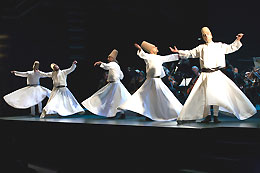
From Russia with Love: «No cough, no noise - attentively, the audience listened to the sounds of strings, piano and voice … Appropriate for American Independence Day, Sarband explored the relationship of Russia and Europe with the USA. It was a colorful soundscape of the th century. Vladimir Ivanoff, musical director of Sarband, guided his listeners through a voyage from Dmitri Shostakovich and Igor Stravinsky to Kurt Weill, Elvis Presley and songs from James Bond movies. Whether and how much Shostakovich was connected with Stalinist leadership and how he expressed this in his music - the stories behind the music were thrilling, informative and witty. » Susanne Träupmann, General-Anzeiger Bonn (Germany), 5.7.13
Sacred Bridges: «With his Ensemble Sarband, Vladimir Ivanoff has deeply immersed himself into the culture of Orient and Occident, bringing to light the most amazing connections.» Babette Kaiserkern,
Potsdamer Neueste Nachrichten (Germany), 26.11.12
Our Father Abraham: «… For many years now,
Sarband have been building breathtaking bridges
between cultures and religions …. Their performances count among the most exciting and beautiful concerts in the entire, extensive Early Music scene … The texts were not only projected via video, but also illustrated with graphic art.Thus ears, eyes, hearts and minds of the enthralled audience were equally touched and enchanted.» Franz Szabo, Kritisches Journal der Alten Musik (Austria), 6-12
Music for Emperors & Sultans: «Across all differences in form and sound, parallels and kinships could be discovered. Turkey was not an exporting country in a musical sense, but, in turn, absorbed Western currentsy» Karsten Blüthgen, Sächsische Zeitung (Germany), 30.1.12
«Wresting Bach's Music From Its Western Moorings. You could hardly have hoped for a finale better suited to the theme than «Passio-Compassio», the Ensemble Sarband concert that closed the festival on Saturday evening at Alice Tully Hall. The Sarband approch is elegant, though not timid in its wresting of Bach's music from its Western moorings, but Vladimir Ivanoff, the group's director and arranger, has an unfailing instinct for finding musical ground where his transformations seem natural.» Allan Kozinn, The New York Times, 21.11.11
Sefarad:
«With their programs, Sarband often open upwhole new musical levels to the listener, levels which had hitherto been unrecognizably wrapped in the veils of folklore … a flamboyant tone painting,
whose intense hues were a blend of Spanish lyricism
and the Romance Ladino language. The enchanting
intonation served the texts which told of love and
jealousy, of fame and longing.» Jan-Gert Wolff,
Main-Spitze (Germany), 11.8.11
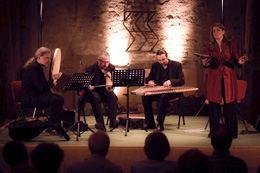
Sacred Bridges: «Politically explosive even today.
This moving, aesthetically and philosophically unique
performance proved all the more relevant. Virtuoso ritual singer Mustafa Dogan Dikmen passed over an exotic bridge of sound accompanied by Byzantine instruments. After this seamless exchange
of Oriental mono- and Occidental polyphony,
Bach's hymn «Wenn ich einmal soll scheiden»
had the final say.» Die Welt (Germany), 1.8.11
«The 13-part concert programme «Tonfolgen» was
simply breathtaking. It abducted the audience also
into the aeroplane hangar at Hangelar and onto an
«Oriental journey», as the performance was titled.
The engine shed at Gummersbach was used as a
«Destination of longing». In five places between
Windeck, Bonn and Bergisch Gladbach, Ensemble
Sarband embarked on a «Journey of the soul» …
It was a splendid experience made possible by the
members of Sarband within such a short period of
time in unusual performance venues.» Gisela Schwarz, Rhein-Berg Online (Germany) , 13.7.11
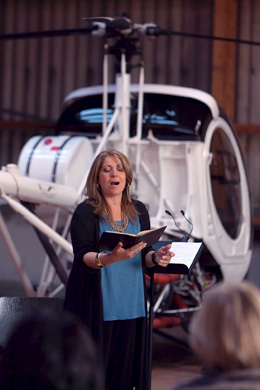
«Moving Arabian Passion. Impressive performance
at the end of this year's Bach Festival at Arnstadt …
It was an incredibly exciting, intense listening
experience. Parts form the St. Matthew's Passion,
rendered instrumentally and vocally, were arranged
to become a new, valuable whole …
Spare images from the Arab world currently in turmoil,
projected to a large screen, naturally underlined
the plea «and tear me out of my fears, by way of your fear and torture!». And the well-worn notion of
authenticity suddenly stood in a whole new context …
The «Arabian Passion» was a deeply moving and therefore invigorating Bach experience.»
Ursula Mielke, Thüringer Allgemeine (Germany), 29.3.11
The Arabian Passion: «The bold construction proved sustainable … »
Marc Hoppler, Der Landbote
(Switzerland), 1.2.11
Passio-Compassio: «Bach, musical spearhead of Christianity, in sounding symbiosis with Arabic and Turkish reed flutes, fiddles and psalteries, mingled with exotic rhythms, oriental-style coloured singing and whirling dervishes. If this circle can be squared, many misunderstandings in the Christian-Muslim relations could be cleared up.Vladimir Ivanoff, musical spiritus rector of this enterprise, consciously does not touch upon the core points of religious difference, but rather concentrates on the centre of the Passion, in which Jesus, feeling forsaken by God, presents himself as a mere human being stripped of his divine mantle. To this end, Ivanoff contrasted the Bachian contributions with chants from the Byzantine, Syriac and Arabic Christmas and Passion liturgies, which are able, in their profound religiosity, spiritual power and great humanity, to build bridges between cultures.
Also the dance ritual of the five dervishes shows the Orient from a mystical perspective that points to the
religions' common roots. The colourful cast allowed
exciting arrangements of well-known hymns such as
«Wenn ich einmal soll scheiden». While Fadia el-Hage turnsthe hauntingly plain melody into live wire with powerful emotion, oriental embellishment and sliding intonation, the polished, crystal-clear a-cappella rendition by the young choir from Cologne represents Western vocal art in pure beauty. In their gripping effect both performances meet without whitewashing the differences between their glorious traditions. At the end of the day, this is not about whitewashing of cultural identities, but about respect for the greatness of two cultures, which – at least in music – are closerto each other in their human content than everyday headlines let us believe. Seen from this angle, «Passio - Compassio» surely belongs to the thematically most interesting
contributions to the current Triennale. Enthusiastic
applause for all participants.» Pedro Obiera,
Giessener Allgemeine Zeitung (Germany) , 22.9.10
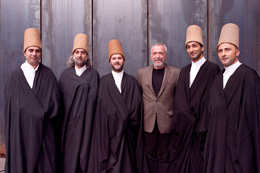
Passio–Compassio: « brought cultures in touch
with each other in the Bochum industry cathedral.
Bach plays music to the dervishes' dance: Passio-Compassio» at the Ruhrtriennal. …
The approaches to merging Orient and Occident presented here were certainly original and creative. …. All this brought to light interfaces as well as points of friction between two highly complex systems of thought and music ... Passio-Compassio supplied a textual superstructure: Biblical passages united with source quotations from the early Islamic and Christian world. And as a climax an intense, aural as well as visual trance arose. Seven Sufi dervishes from the Golden Horn, clad in flowing white garments, found their way into their circling, meditative movements. In this moment, the word "trance" did justice to its proper meaning: trans-ire: transition into a higher stage of rapture.» Stefan Pieper, nmz (Germany), 19.9.10
«Although it sounds like a daring venture to mix
Bach's compositions with the spontaneity of Arabic
music, Jazz and borrowings from Sufi mysticism:
«Passio-Compassio» will be remembered as
one of the most felicitous and unified programmes of the Ruhrtriennale. The connection between
the world religions Christianity and Islam, the issues of sorrow and empathy, love and passion – this programme got right to the heart of it with irresistible wisdom and rare harmony ... German, Turkish, Arabic and Aramaic texts floated above the music in harmonious exchange. The hypnotically whirling
dance of the dervishes and words of the great Sufi mystic Rumi, projected to the large screen, made clear on a different level than that of the rational mind what
this means: a love divine.» Max Florian Kühlem,
Ruhrnachrichten (Germany), 19.9.10
«Passio-Compassio, to be exact: Passio transformed
into Compassio: Emotion translated and transcended
into the language of art or religion.Sentiments that are being conveyed into a new form. It is part of the
artistry of musical director Vladimir Ivanoff to leave it
up to the audience to choose whether they want to
read the events on stage in a religious or an artistic
way. One is grateful for this. Genuine art subsists
on the freedom of its interpreters.» Kersten Knipp,
NDR Kultur (Germany), 18.9.10
The Arabian Passion: «A stirring oratorio
for inter-
religious coexistence ... a uniqueprogramme ...
Vladimir Ivanoff, percussionist and musical director of Sarband, set up the programme wisely, avoiding the major mistake that could have been made: the pastiche. The result, subtlybalanced, convinces
and captivates..»
Javier Losilla, El Periodico de Aragon (Spain), 9.8.10
In the Realm of the Golden Apple: «… one of the most interesting programs at the Styriarte festival: humorous, entertaining, with exciting content.» M. Gasser, Kronenzeitung (Austria), 18.7.10
Mohammed's Birth & Dream Voyage to Heaven: «Ensemble Sarband prove that 15th-century Sufi
music can be exciting and relevant to Western
listeners. Every performance of Sarband is an
experience … Before Jordi Savall became famous with it, Ivanoff was already committed to the vision
that the separation between Orient and Occident did not make sense in Early Music …
What makes Sarband so unique is Ivanoff's persistent effort to make Oriental music accessible to Western listeners..» Stefan Grondelaers, De Standaard (Belgium), 25.5.10
Sacred Bridges: «Astonishing how well the different
elements matched each other. In many instances the
passage from one religion to another wasn't perceptible at all.» Andreas Schröter, Ruhrnachrichten (Germany), 12.5.10
Hortus conclusus / The Enclosed Gardens of Paradise: «On the eroticism of faith. Vladimir Ivanoff and his Ensemble Sarband enchanted with treasures of the medieval Orient and Occidentat the Graz Easterbfestival. Vladimir Ivanoff is a sophisticated cartographerof the exceptional. Delightful array of voices … The projected texts, displayed onto images of Gregorian notation, miniatures from the Bible or Oriental carpets, were a work of art in their own right. In a nutshell: seamless enjoyment.» Michael Tschida ,Kleine Zeitung (Austria), 31.3.10
The Perfect Light: «Building bridges is easier said than done - on the concert stage it worked out perfectly!
A perfectly performed choreography, a stringently woven golden
thread: recitations and music telling the births
of Jesus and Mohammed are interwoven
without gaps into a diversified and entertaining
program.»
Marion Aigl, Wiener Zeitung, 23.12.09
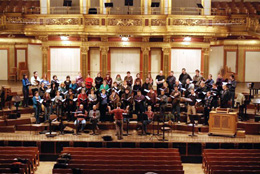
The Arabian Passion:
«Bach's Passions, arab music,
jazz elements and images of suffering in the Middle
East are joined
to a monumental work of art…
All of a sudden, the listener is taken from his passive
role and transported
into the tale of the suffering of
Jesus Christ and of many people in the Middle East.
After intense waves of enthusiasm, not only the
audience,
but also the artists leave the Stadtkirche
in a state of deep emotion.»Der Neue Tag (Germany), 31.8.09
The Waltz: «Sarband in the most delightful musical contention with Ensemble Resonanz …
On a second stage to the side, two whirling dervishes created an
impressive contrast
to the virtuoso artistry of
Catolina Aguero and Yaroslav Ivanenko's couple dancing.
An entertaining and witty opening of the two very different cultures to each other … » Jürgen Gahre, Bonner Generalanzeiger (Germany), 01.8.09
The Arabian Passion: «… a sublime act of balance
between Ethno, sound adventure and art music …
powerfully absorbing and suggestive scenes …
emotional climaxes that make the listener hold his
breath.»
Jürgen Scharf,
Oberbadisches Volksblatt
(Germany), 10.7.09
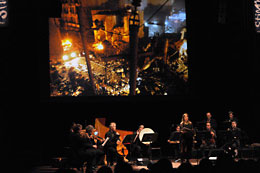
Fountain of Youth: «Refreshing »Fountain of Youth«at the Styriarte. … medieval fantasies of love and violence:
overwhelming the Ensemble Sarband
around mastermind Vladimir Ivanoff.»
Reinhold Reiterer, Kleine Zeitung (Austria), Graz, 13.7.08
Sacred Bridges: «Apart from its equally exciting and
symbolically strong concept, the performance was
also musically convincing …
A concert a long way
fromany crossover randomness.» Stä, Hamburger Abendblatt (Germany), 28.1.08
Sheherazade: A Great Love: «Enchantingly sweet bridgings … Dilek Geçer''s many shaded, lyrically sweet soprano was the connecting element … indeed amazing as a stylistic balancing act …
Director Vladimir Ivanoff preserved this evening's narcotic sweetness.»
Matthias Wagner, Kronenzeitung,
Graz (Austria), 15.7.07
Sefarad:
«… This symbiosis made an exceptional
master concert a successfully integrated work of art
with a highly instructive background.» B. Hoeltzenbein, Neue Westfälische (Germany), 3.11.06
The Waltz: «You can literally see the envoys'
stagecoaches rattle back and forth between Vienna
and Istanbul,
so skillfully interlaced are the
compositions from both cultures …
These different
characters are excellently underlined by the two ensembles.»
Anja-Rosa Thöming, FAZ (Germany), 3.12.05
Sacred Bridges:
«… Ivanoff effortlessly connected
on the concert stage what is utopian on the global
stage:
that nothing stands between Christians and
Jews and Muslims. Except for «and».» Michael Tschida,Kronen Zeitung (Austria), 4.6.06
The Waltz:
«Concerto Köln and Sarband built a
bridge on the stage of the Festspielhaus in Bregenz,
a strong bridge
between Orient & Occident.»
Vorarlberg Online (Austria), 18.5.06
The Arabian Passion:
«It is Vladimir Ivanoff's
strong point, to join cultures and to build musical
bridges between Orient and Occident.
With the
«Arabian Passion» … he succeeded in a brilliant
way. Heart, mind, gesture and communication with
the other artists were merged into an intensive whole.
… I could not have imagined more beautiful music
for Good Friday.»
Franz Szabo, Salzburger
Nachrichten (Austria), 4/06
Sacred Bridges:
«… this was more than an ordinary
concert, this was a ritual celebration of bridge-
building
that joined people and religions … fascinating unityof voices, instruments and physical
expression …
completely rounded, amazing and full
of hope how people can come together, independent
of their origin, religious tradition
or even detachment from religion … The Psalms of David are a quite stable roof for understanding.»
Reinhold Lindner, Freie Presse (Germany), 19.7.05
Sacred Bridges:
«Exciting bridge-building
with musical depth … perfectly natural merging
of two sound worlds …»
Susanne Dietz,
Maintal Tagesanzeiger (Germany), 18.7.05
Sefarad: «... a magic evening - extraordinarily fascinating works, full of colours and warmth …» Renato della Torre, Messagero Veneto (Italy), 17.7.04
Satie en Orient / Danse Gothique: «… The choice of repertoire, the congenial orchestration and the empathetic, imaginative musical performance turned this evening not only into an exceptional experience, but also into balm for the soul. The audience felt greatly enriched.» Klaus Winterberg, Kölner Stadtanzeiger (Germany), 20.2.03
Son of the Sheik:
«There, at the borders of Europe,
where our eurocentric sciences and arts stop,
Vladimir Ivanoff just takes off … » Thomas Muttray-Kraus, Oberbayerisches Volksblatt, 3.2.01
Satie en Orient / Danse Gothique: «Ivanoff crosses
borders and thus finds a new music which transfers
our dreams about the Orient into a soundscape.»
Franzpeter Messmer, Fono Forum 11/00
Sefarad:
« ... a particularly delicious program, as
much for the refinement and accomplishment of the
ensemble's players as for the experience of hearing
music that is unquestionably «other», yet somehow
familiar.
There's much to take away from such a
concert.» Michael Manning, The Boston Globe, 15.6.99

